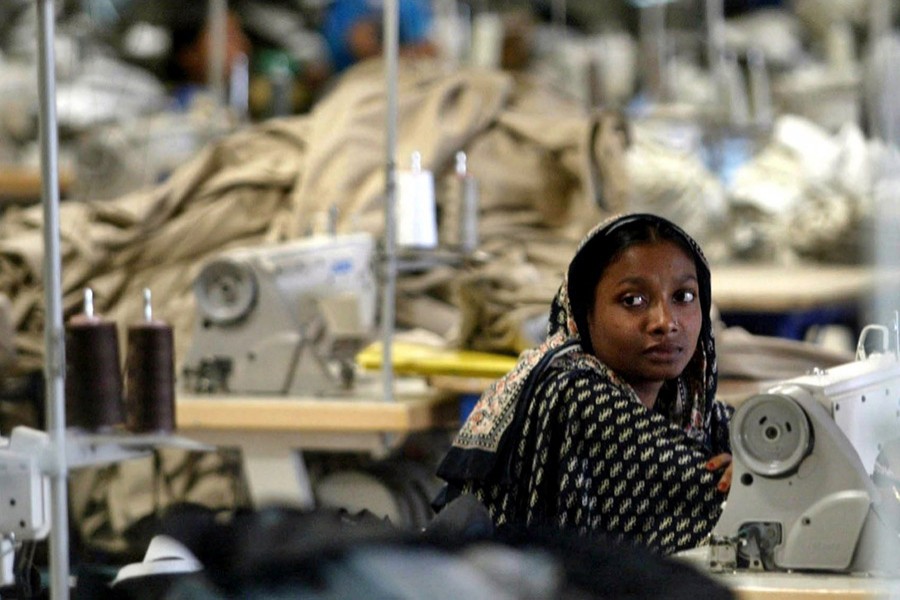Garment workers in the global supply chain are yet to receive their desired living wages, as the leading international apparel buyers have failed to keep their pledges in this regard, according to a latest report.
It identified outsourcing living wage commitments to multiple external initiatives, widespread inconsistency and confusion amongst corporations over the definition of a living wage, and absence of benchmarks or a roadmap among the seven obstacles to the payment of living wage.
Local industry leaders said the report has referred to core purchasing practices of the companies, which source from all over the world.
Some 4.0 million Bangladeshi workers, out of the global 60 million, are not being paid living wages, and still product prices are declining.
"Consumers are purchasing products they believe are made by workers earning living wages, when in reality, low wages continue to be the status quo across the global garment industry," said the report.
The Sheffield Political Economy Research Institute (SPERI), University of Sheffield published the report - 'Corporate Commitments to Living Wages in the Garment Industry' - last month.
It investigated the commitments and actions that 20 garment companies had made to paying living wages across their supplier networks.
It used the primary data collected through a survey, disseminated by the Clean Clothes Campaign to garment companies, as well as data collected by the SPERI.
Over the last decade, leading global corporations in the garment industry have begun to make commitments to deliver living wages to the workers that make their clothes.
It opined that some garment companies are making ambitious commitments to pay living wages in their global supply chains, which are indeed far more ambitious than the commitments apparent in other sectors.
But, the companies are currently falling short when it comes to take meaningful actions to implement these commitments, it noted.
Besides, corporations are reliant on social auditing for compliance and enforcement of living wage commitments, a tool known to be flawed, producing misleading depictions of labour standards in supply chains, according to the survey findings.
The research identified lack of transparency among corporations about the wages that are actually paid to workers throughout their supplier networks along with weak enforcement of freedom of association rights as obstacles in implementing living wages.
"Garment companies were asked if they publish suppliers' lists, as well as whether they publish wage data for workers in supplier factories. Fifteen companies published clear supplier lists, including factory addresses, which are encouraging, but none was able to provide corresponding data on the wages being paid within these supplier factories," the report read.
Garment companies are heavily dependent on social auditing to monitor and enforce living wage commitments, but this tool is widely known to be ineffective and open to abuse, it said.
"While the robustness of social auditing methodology varied across companies, the data overall suggests that the companies are doing little to overcome the traditional limitations of social auditing with respect to their deployment of the tool to monitor and enforce living wages."
The report made a series of recommendations for achieving more meaningful progress towards living wages in global supply chains.
The recommendations included defining the living wages by collectively addressing the significant confusion about what constitutes living wages as well as the sizable gap that exists between rhetoric and reality of corporate commitments.
Garment companies should acknowledge the role that business models and sourcing practices can play in creating the conditions where workers are paid low wages within their supply chains, and explain how they will address these pressures in their efforts to deliver living wages.
"Practices such as buying at the lowest cost and unfair or inadequate payment arrangements exert a powerful downward pressure on suppliers, who then rely on the exploitation and coercion of workers to fulfil contracts and produce high-volume of goods at a low cost."
Companies should increase transparency regarding the payment of living wages in their supplier payment as well as publish clear roadmaps and timescales on when and how they will fully achieve their commitments to pay living wages to workers.
Its other recommendations included the companies' recognition of the essential role of unions and worker organisations in securing living wages for workers in their supply chains, upholding workers' fundamental rights to freedom of association and collective bargaining.
A step change in approach will be necessary for garment companies to ensure providing living wages in their supply chains. The first step will be to adopt existing benchmarks and living wage calculation methodologies, and to clearly map out how they will achieve living wages for different tiers of suppliers and by when, it further said.
Until the companies can take such steps, living wage commitments are likely to remain in the realm of rhetoric rather than leading to substantial changes that address low wages for workers in the global garment supply chain, it added.
When asked, Dr Rubana Huq, president of the Bangladesh Garment Manufacturers and Exporters Association (BGMEA), said Bangladesh gets the lowest prices from all brands of the world.
The prices of locally made apparel items have dropped by 3.6 per cent in the European Union (EU) and 7.0 per cent in the United States (US).
Besides, the definition of living wages is yet to be universally agreed upon and accepted by all, she said, suggesting that the definition of living wages should be agreed on the basis of country realities.
"We hope that prices paid to suppliers will also and always be considered to be spoken of every time the reference to living wages is made," she added.


